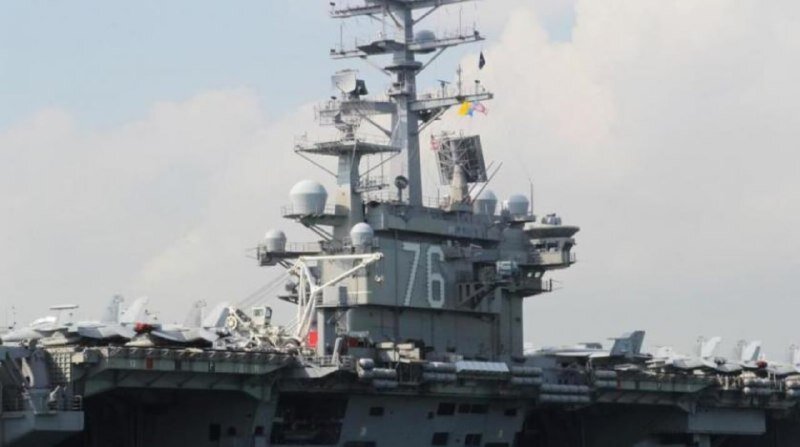China slams "destructive" U.S. positions
U.S. interference in the South China Sea under scrutiny

TEHRAN- China has accused the United States of meddling in the South China Sea by taking destructive positions on matters of Beijing’s sovereignty toward islands and reefs in the area, saying the interventions from senior officials in Washington are only fueling regional tension and instability.
Defense Ministry spokesman Wu Qian made the remarks at a press conference in Beijing when asked about the provocative statements made by senior U.S. military officials in support of the Philippines on the South China Sea.
According to media reports, U.S. Secretary of Defense Lloyd Austin recently said that the South China Sea arbitration award is binding on all parties and the Mutual Defense Treaty between the U.S. and the Philippines extends to Philippine public vessels, aircraft, and armed forces, including the American military vessels in the South China Sea.
The commander of the U.S. Navy's Seventh Fleet said the alleged use of a water canon by the Chinese Coast Guard against a Philippine vessel "must be challenged and checked." He also "assured the Philippines of U.S. backing".
Experts believe that countries in the region should solve any disputes among themselves without U.S. interference that tends to fuel instability.
Wu reiterated that China has indisputable sovereignty over the Nansha Islands and the adjacent waters, including the Ren'ai Jiao. He said the moves by the Philippine side infringed upon China's sovereignty and violated the Declaration on the Conduct of Parties in the South China Sea (DOC), and the China Coast Guard's responses are legitimate, lawful, professional, and standard.
"I need to stress that the United States has been inciting, supporting and participating in the Philippines' delivery of construction supplies to the warship illegally 'grounded' on Ren'ai Jiao. The U.S. has repeatedly threatened China by citing the U.S.-Philippines Mutual Defense Treaty, made an issue of the so-called South China Sea arbitration award, which is illegal, null and void, and smeared China's legitimate and lawful maritime law enforcement activities. These have violated the Charter of the United Nations and the basic norms in international relations, contravened the public commitment of the U.S. not to take a position on the sovereignty issue of islands and reefs in the South China Sea, seriously undermined peace and stability in the South China Sea, and escalated tensions in the region," Wu stated.
"We urge the U.S. to stop meddling in the South China Sea issue, stop sowing confusion and discord, fanning the flames and causing trouble, and stop undermining regional peace and stability. We also hope that countries in the region will stay on high alert, well implement the DOC, and work with China to jointly uphold peace and stability in the South China Sea.”
The Defense Ministry has also warned that “the Chinese armed forces will resolutely safeguard national sovereignty and maritime rights and interests, and firmly safeguard peace and stability in the South China Sea."
The United States has been provoking China on a number of issues, including the supply of military arms to separatist forces in Taiwan in violation of the One-China policy.
China has once again called on the United States to stop conniving with secessionists in Taiwan by providing arms to the self-ruled island, Foreign Ministry spokesman Wang Wenbin said at a press briefing in Beijing.
The administration of U.S. President Joe Biden has approved the first-ever provision of arms to Taiwan under the so-called Foreign Military Financing (FMF) program, which Washington has so far only rubber stamped for sovereign states with UN status.
China has slammed the move, saying it violates the U.S. commitment to the One-China principle.
The vast majority of the international community abide by the One-China principle, with the exception of the United States and a few of its allies. Only the U.S. and 12 other states are violating the One-China policy with measures that bypassing Beijing and engaging officially and militarily with separatist forces in Taiwan, a territory that is part of the Chinese mainland.
"By providing arms to China's Taiwan region through the so-called Foreign Military Financing (FMF) program that only applies to sovereign countries, the United States seriously violates the one-China principle and the provisions of the three China-U.S. joint communiques, especially those of the August 17 Communique of 1982, seriously violates international law and basic norms governing international relations, impairs China's sovereignty and security interests, endangers peace and stability ‚across the Taiwan Strait and sends a gravely wrong signal to the separatists forces in Taiwan. China strongly deplores and resolutely opposes the move," Wang told reporters at a press briefing.
Taiwan has no status at the United Nations, with the only representation for Taipei being the People’s Republic of China at the world’s top body as well as all other international organizations.
"There is only one China in the world and Taiwan is an inseparable part of China's territory. The Taiwan question is purely China's internal affair, which brooks no interference by any external force. We urge the United States to earnestly abide by the One-China principle and provisions of the three China-U.S. joint communiques, stop enhancing military contact with the Taiwan region or arming it in any pretext and in any form, stop creating factors that could intensify tensions in the Taiwan Strait, and stop conniving with and supporting the separatists’ attempt to seek Taiwan secession by force."
The Chinese Foreign Ministry has also warned that "no one should underestimate the Chinese people's staunch determination, firm will and powerful capability to safeguard national sovereignty and territorial integrity."
Critics accuse the U.S. of using the South China Sea, Taiwan and other issues in an attempt to contain China's economic growth, with more countries switching to the East and seeking trade with China's powerful economy at the expense of the United States and its hawkish foreign policies.
Leave a Comment